Serving 542 students in grades Kindergarten-6, James A. Long Elementary School ranks in the bottom 50% of all schools in Florida for overall test scores (math proficiency is bottom 50%, and reading proficiency is bottom 50%).
The percentage of students achieving proficiency in math is 44% (which is lower than the Florida state average of 52%). The percentage of students achieving proficiency in reading/language arts is 46% (which is lower than the Florida state average of 52%).
The student:teacher ratio of 16:1 is lower than the Florida state level of 17:1.
Minority enrollment is 46% of the student body (majority Black), which is lower than the Florida state average of 65% (majority Hispanic).
Quick Stats (2025)
- Grades: Kindergarten-6
- Enrollment: 542 students
- Student:Teacher Ratio: 16:1
- Minority Enrollment: 46%
- Overall Testing Rank: Bottom 50% in FL
- Math Proficiency: 44% (Btm 50%)
- Reading Proficiency: 46% (Btm 50%)
- Science Proficiency: 40-44% (Btm 50%)
- Source: National Center for Education Statistics (NCES), FL Dept. of Education
School Overview
James A. Long Elementary School's student population of 542 students has declined by 19% over five school years.
The teacher population of 33 teachers has declined by 8% over five school years.
Grades Offered
Grades Kindergarten-6
Total Students
542 students
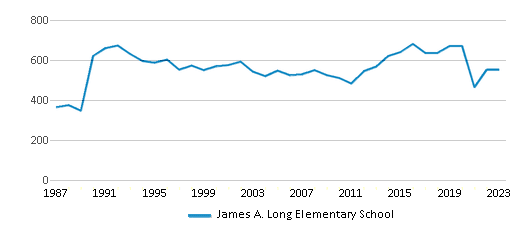
Gender %
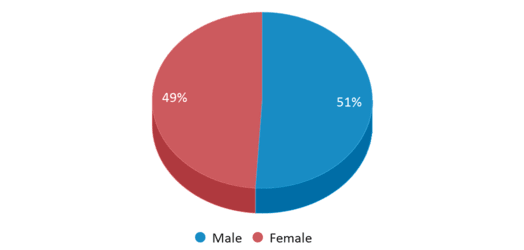
Total Classroom Teachers
33 teachers
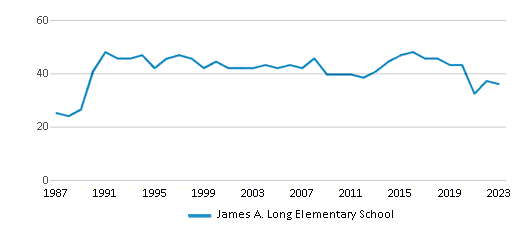
Students by Grade
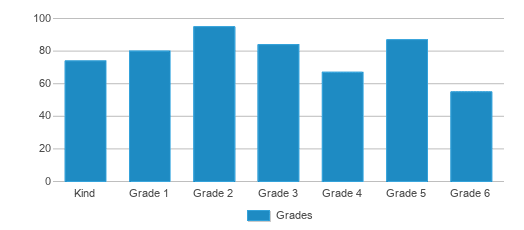
School Calendar
School Rankings
James A. Long Elementary School ranks within the bottom 50% of all 3,704 schools in Florida (based off of combined math and reading proficiency testing data).
The diversity score of James A. Long Elementary School is 0.59, which is less than the diversity score at state average of 0.70. The school's diversity has stayed relatively flat over five school years.
Overall Testing Rank
#2258 out of 3704 schools
(Bottom 50%)
(Bottom 50%)
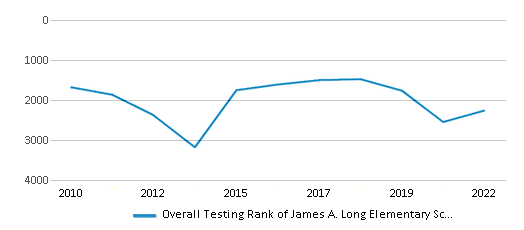
Math Test Scores (% Proficient)
44%
52%
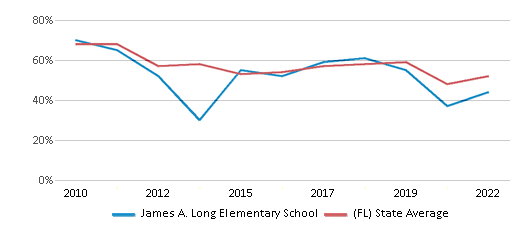
Reading/Language Arts Test Scores (% Proficient)
46%
52%
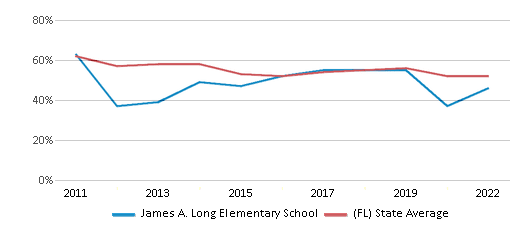
Science Test Scores (% Proficient)
40-44%
52%
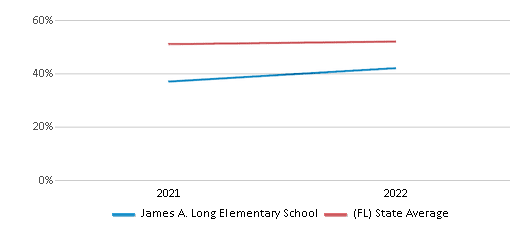
Student : Teacher Ratio
16:1
17:1
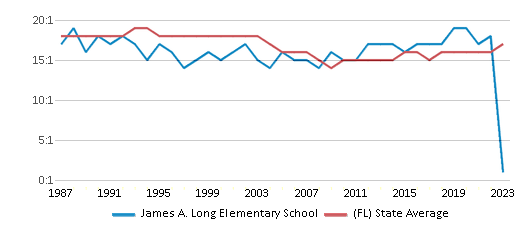
American Indian
n/a
n/a
Asian
n/a
3%
Hispanic
7%
37%
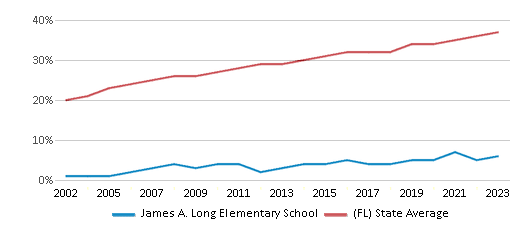
Black
35%
21%
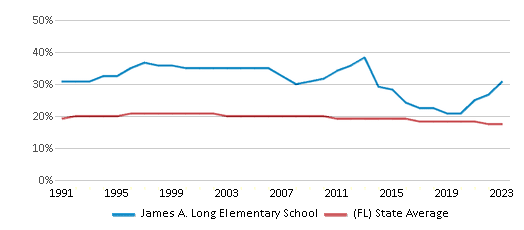
White
54%
35%
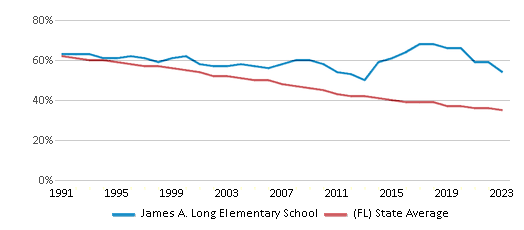
Hawaiian
n/a
n/a
Two or more races
4%
4%
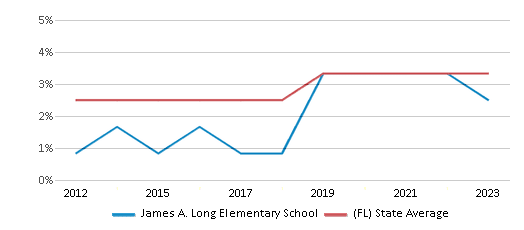
All Ethnic Groups
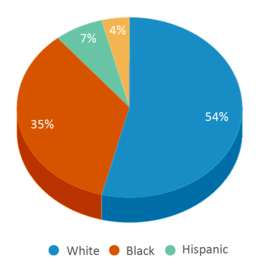
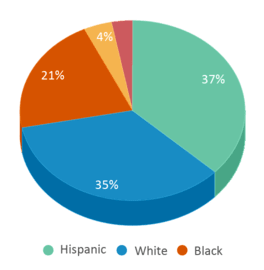
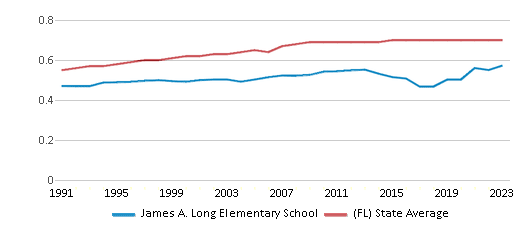
Participates in the National School Lunch Program (NSLP)
Yes
Eligible for Free Lunch
70%
47%
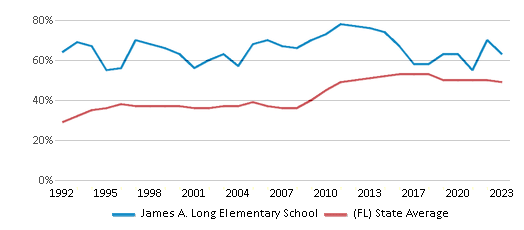
Eligible for Reduced Lunch
4%
4%
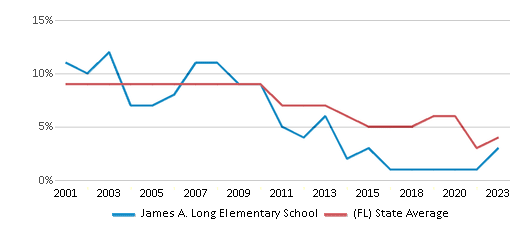
School Statewide Testing
School District Name
Source: National Center for Education Statistics (NCES), FL Dept. of Education
Profile last updated: 02/09/2025
Frequently Asked Questions
What is James A. Long Elementary School's ranking?
James A. Long Elementary School is ranked #2258 out of 3,704 schools, which ranks it among the bottom 50% of public schools in Florida.
What schools are James A. Long Elementary School often compared to?
James A. Long Elementary Schoolis often viewed alongside schools like Kelley Smith Elementary School by visitors of our site.
What percent of students have achieved state testing proficiency in math and reading?
44% of students have achieved math proficiency (compared to the 52% FL state average), while 46% of students have achieved reading proficiency (compared to the 52% FL state average).
How many students attend James A. Long Elementary School?
542 students attend James A. Long Elementary School.
What is the racial composition of the student body?
54% of James A. Long Elementary School students are White, 35% of students are Black, 7% of students are Hispanic, and 4% of students are Two or more races.
What is the student:teacher ratio of James A. Long Elementary School?
James A. Long Elementary School has a student ration of 16:1, which is lower than the Florida state average of 17:1.
What grades does James A. Long Elementary School offer ?
James A. Long Elementary School offers enrollment in grades Kindergarten-6
What school district is James A. Long Elementary School part of?
James A. Long Elementary School is part of Putnam School District.
School Reviews
5 10/9/2020
Great school. My son and daughter's teachers are always talking to us through the dojo and keeping us in the loop. I have nothing bad to say about James. A Long Cambridge program.
1 3/26/2020
Whoever wrote the top review is not aware of how terrible this school is. Don't send your kids here if you can help it. Poor communication between the faculty and staff. The teachers have no idea what is going on outside their own classroom. Staff and teacher treat the students like a statistic I.e. they don't care about our kids here. Terrible safety we tested the staff and they have no idea who they let in the door. We could have walked in and shot up the place very easily. No officer on property. This school system is failing our children. Asst Principal sent a student home, claiming she was suspended and the child's teacher had no idea about it. Why work in the field of education if you don't care about children?? I hope more parents are alerted to this poor excuse of a school and take action. They also need a bullying program. Please contact the superintendent and the school board. Putnam county needs to clean up our schools.
1 3/26/2020
Don't send your kids here. The teachers are useless and don't communicate with the parents. Poor staff training, terrible bullying problem. Idk what the principal and asst principal do all day but it's not helping our kids. Someone needs to do something about this place.
4 12/27/2018
It''s four stars....
Review James A. Long Elementary School. Reviews should be a few sentences in length. Please include any comments on:
- Quality of academic programs, teachers, and facilities
- Availability of music, art, sports and other extracurricular activities
Recent Articles

What Is A Charter School?
Explore the world of charter schools in this comprehensive guide. Learn about their history, how they operate, and the pros and cons of this educational innovation. Discover key facts about charter schools, including admission policies, demographics, and funding, as well as what to look for when considering a charter school for your child.

10 Reasons Why High School Sports Benefit Students
Discover the 10 compelling reasons why high school sports are beneficial for students. This comprehensive article explores how athletics enhance academic performance, foster personal growth, and develop crucial life skills. From improved fitness and time management to leadership development and community representation, learn why participating in high school sports can be a game-changer for students' overall success and well-being.

February 05, 2025
Understanding the U.S. Department of Education: Structure, Impact, and EvolutionWe explore how the Department of Education shapes American education, from its cabinet-level leadership to its impact on millions of students, written for general audiences seeking clarity on this vital institution.






